By Andrey Kolganov and Aleksandr Buzgalin, reporting from Bolotnaya Square
Why, after many years when street politics in Russia were deep-frozen, have citizens again acquired a taste for street actions? After a public rally near Chistie Prudy metro station in inner Moscow drew six or seven thousand people, what caused ten times as many to then gather on Bolotnaya Square?
Can it be the crisis? The fall in living standards? When the crisis first hit, nothing took place to remotely match the recent meetings.
When a crisis first grabs people by the throat, they tend not to go out and demonstrate, but simply try to survive. They can of course be driven to complete despair, but what happens then isn’t a public meeting but a revolt, a mutiny, an uprising.
The people who came out onto Bolotnaya Square looked perfectly well-off; they weren’t paupers, or marginalised, and neither were they the familiar figures you always expect to see at political gatherings (the latter were probably there too, but they were dissolved in the crowd to the point where you didn’t notice them). Here undoubtedly is the answer to the question, “Why?” – because if well-off people, used to standing on their own feet, are systematically humiliated and have their dignity trampled on, they stop putting up with it. People like this won’t suffer endlessly in silence.
It is people of this sort who are now joining in protests on the streets of Moscow. They have been forced too shamelessly, and for too long, to take part in farcical elections where the required percentage of the votes has been achieved by throwing bundles of ballot-papers in the direction of the “party of power”; through a “merry-go-round” of voters with suspect credentials; through banishing over-curious observers from the polling-places; and through direct forgery of electoral documents. Against the background of such methods, complaints about unequal opportunities for election campaigning seem almost beside the point.
The citizens of Russia have shown they want democracy – and not the kind of charade they have been forced to accept until now, but a genuine right to cast their votes and to be heard. All the organisations that have helped build the rallies or that have attended with their placards and banners have put forward democratic slogans. This is completely correct, since these demands make up the common platform that unites the opposition. Everyone, whatever the precise shade of their politics, needs honest mechanisms for counting citizens’ votes, even if these mechanisms are only a little honest in the early stages.
It’s clear, however, that the people who now hold power intend to spit on the slogans and demands of the opposition. Do you suppose they’re scared by the noise of meetings, and that they’ll voluntarily start turning out their pockets that are stuffed with the money they’ve stolen from us? If power were to change hands the present authorities could be forced to do this, so they can be expected to stand united in defending the right to thieve, to take bribes, to embezzle and so forth. To really scare the authorities you need to bring out not 7000, and not 70,000, but at least 700,000 people to attend rallies. Where is the opposition to get so many activists?
The opposition will find these adherents if it remembers that in Russia there are people for whom the most important thing is not the way votes are counted, but how to make it through to payday, how to find a child care centre for their children, how to get the money to equip them for school and to feed them tomorrow, how to pay for their higher education, and how to buy an apartment at today’s unbelievable prices. In short, if the democratic opposition remembers the problems that weigh on most of the population, then there is a chance that this majority of people will listen to it and support it. But if it thinks of honest voting solely as a means of winning seats in parliament at the next elections, all the steam of protest will be let off through the whistle, and today’s burst of public activism will remain a storm in a teacup. Meanwhile, the opposition so far has failed to provide any intelligent answer to the question of how the ruling elite might be forced to surrender the “right” it has usurped to manipulate the will of citizens. Russia’s rulers will not willingly yield the positions they hold in this area.
What about the political parties that claim to be aligned with the opposition? There were right-wing nationalists on Bolotnaya Square, but the shrill-voiced demagogue Zhirinovsky, who loves to pose on television shows as a fearless teller of the truth (while voting as the Kremlin instructs him), did not put in an appearance. Nor was there any sign of the intelligent gas-bag Yavlinsky, so attentive in his program to questions of rights and freedoms but so helpless when it comes to practical action – though again, plenty of his supporters were at the rally. Mironov, whose “Russian Justice” party plucks at our heartstrings with its concern for the popular welfare – and which meanwhile acts as a loyal opposition for “their excellencies” – was not to be seen either, though Oksana Dmitrieva spoke from the platform. Finally, the leaders of the Communist Party of the Russian Federation did not show up, though placards of various of the party’s organisations were in evidence. Perhaps Communist leader Gennady Zyuganov also likes playing the role of loyal opposition.
Still, we should not be unfair; each of the parties listed here is prepared to show its face at a protest meeting. But how far will they go in their demands, and how radical will the actions be that they are prepared to initiate? Will these parties, as in the past, stick to the role of obedient, unassuming talk-merchants? Most importantly, will they show any desire or ability to unite with the mass of citizens who are not members of political parties in staging actions that put real pressure on the authorities, even if these actions are only on the level of activity of the Occupy Wall Street movement? Or, will these parties once again set out to lead “the masses” and “the electorate” solely in the hope of being entrusted with a further ten seats in parliament?
And now a few photos by Andrey Kolganov
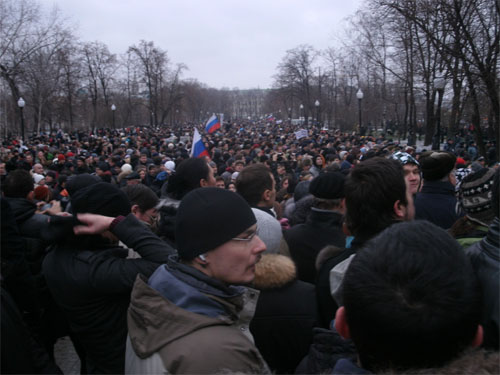
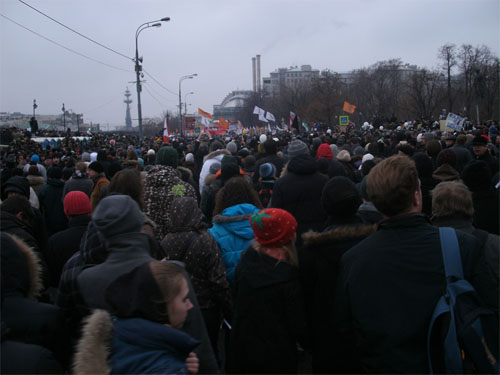
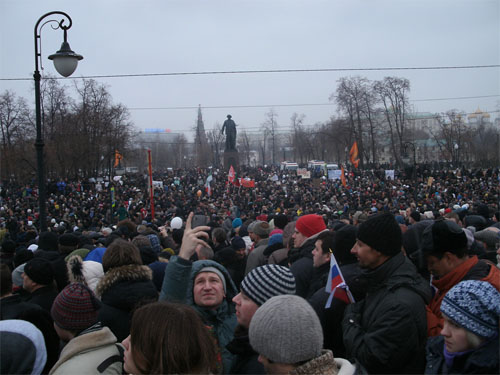
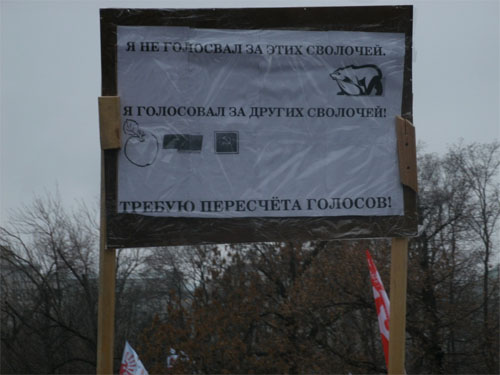
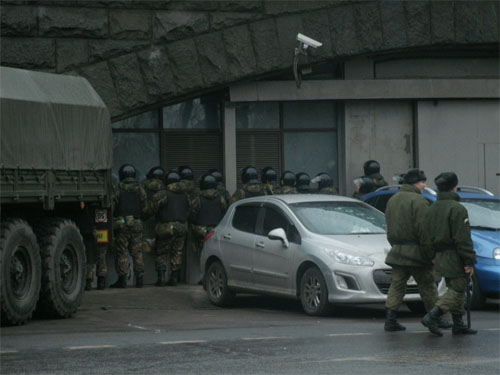
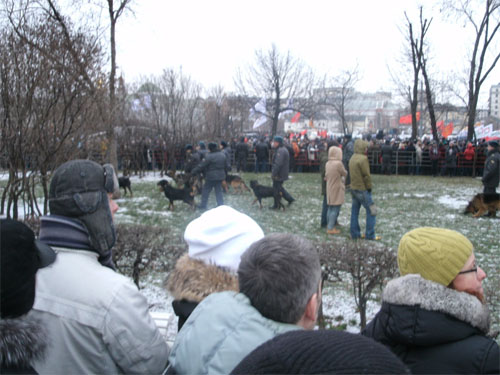


Be the first to comment